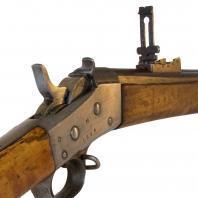-
Posts
456 -
Joined
-
Last visited
Contact Methods
-
Website URL
https://www.youtube.com/@littlef9304/featured
Profile Information
-
Gender
Male
-
Location
Colorado
-
Interests
Collecting Antique Firearms. New to Leatherworking. Holsters
LW Info
-
Leatherwork Specialty
Holsters
-
Interested in learning about
leathercraft
-
How did you find leatherworker.net?
google
Recent Profile Visitors
The recent visitors block is disabled and is not being shown to other users.
Littlef's Achievements

Member (2/4)
-
That’s a nice looking bandolier!
-

DIY Tooling Easy Carve Concentrate
Littlef replied to thecodyvance's topic in Leatherwork Conversation
I don’t think it needs that level of precision. - similar to asking what ratio of soap and water do you use when washing your hands. When I’m casing my leather, I have a continuous pressure misting bottle. I mist the leather till I get the hydration where I want it. Then, I have a bar of glycerine soap. I take a small 1” paint brush, dip it in water swirl it around on a bar of glycerine soap until it’s a little sudsy, and I take the glycerine soap suds mixture and wipe it on the leather. If I was using Liquid glycerine I would make a similar combination. -
You can try goo-gone. It’s good at dissolving adhesive, however it may also discolor the leather. I’d think a dark stain would conceal it, but you might see discoloration if is going to be a natural or lighter color.
-
That looks sharp chuck!!
-

New pistol, new holster
Littlef replied to Thadrick's topic in Gun Holsters, Rifle Slings and Knife Sheathes
That’s nice, love it! -
FYI: I would not use spent casings to make a bandolier. (Unless you are running them through a resizing die first.). The cases expand when they are fired. The loops will be loose when carrying new ammo, if they were made from spent casings.
-
A couple of suggestions. (1) theres a good possibility you won’t find a dye to match.—- but if you buy two of three dyes you might be able to experiment mixing them to color match. ( same thing as color matching paint at the hardware store.). (2). I would recommend cutting the dye 50/50 with alcohol. Apply light even coats. When you dilute the dye, it’ll be a lighter shade. You can go back and add additional coats to darken it. If you dyed it full strength, and it’s too dark, theres not really a way to lighten it.
-
Nice job. That’s really clean. I dig it.
- 17 replies
-
- basketweave
- hunting knife
-
(and 3 more)
Tagged with:
-
The alignment pins that Fred posted work great. Another option would be to use a bunch of saddle stitch needles. I do that when I’m sewing a thick welt. I align holes with a couple needles. Then use a little bar clamp to keep it closed tight… add a couple more needles in like every other… or every third hole with a few little bar clamps spaced ever so often. Then I remove them as I saddle stitch down the welt.
-
I made ONE for a friend, and it took me a couple months to work it out, in my down time. This is a hobby for me. I don’t have enough hours in the day to try and complete orders after finishing a full day at my job.
- 25 replies
-
- doc holiday
- val kilmer
-
(and 2 more)
Tagged with:
-

Mountain Possibles Bag, Flint Wallet, Scrimshaw Turkey Call
Littlef replied to Littlef's topic in Show Off!!
It was a rewarding project. It’s definitely sparks a lot of conversation when people see it. -

Mountain Possibles Bag, Flint Wallet, Scrimshaw Turkey Call
Littlef replied to Littlef's topic in Show Off!!
Thank you very much! Thank you sir! -

Total noob w/ bullet loop question…
Littlef replied to Ravenshurst's topic in Gun Holsters, Rifle Slings and Knife Sheathes
Leather stretches with age. You want them fairly tight from the build. When you are fine tuning the loops…. Use new brass. Don’t use fired brass, because they’ve expanded…. Then new brass will be loose. If you start off loose, as the leather breaks in, you’ll wind up losing rounds. rimed rounds will rest on the rim, but you should be able to make loops for 45acp and have them hold. Realistically I think modern gun belts with bullet loops are far more for looks than truly expecting to be reloading from the loops all the time. If I was reloading on the clock, I’d be inclined to keep a handful of loose rounds in a dump pouch, rather than trying to reload from bullet loops. If you are just practicing, having an extra box with you is more practical. The only time I might worry about losing rounds would be if you have a day hunting on horseback. -

Can you reliably compensate for crummy lighting with Photoshop?
Littlef replied to AEBL's topic in Leather Photography
I used to use those same home depot shop lights with print paper taped over them. I found on Amazon and eBay they sell cheap lighting setups with tripods and umbrellas in the $40 range. The light socket itself is in the same quality range as a shop light… but then you have umbrellas to diffuse and a tripod with height and angle adjustments. It helped my lighting being able to easily reposition, and a white umbrella gives you more control over how it diffuses, for a pretty small price tag. https://www.ebay.com/itm/201868646712?mkcid=16&mkevt=1&mkrid=711-127632-2357-0&ssspo=JxFZRo4fQxa&sssrc=4429486&ssuid=_kGbz7lnTvS&var=&widget_ver=artemis&media=COPY -

Can you reliably compensate for crummy lighting with Photoshop?
Littlef replied to AEBL's topic in Leather Photography
If you shoot in raw, you can salvage some quite mediocre shots From under or overexposure. You’ll never turn a Trash photo into a prize winner. 1. shoot a lot. 2. Check your histogram and image preview often. It’s good to turn the “blinkies” on, which show over exposure or under exposure. That gives you a quick reference when you’re shooting fast, so if the preview has a lot of blinking parts… stop and fix your exposure. more direct answer… you should never intend to have bad lighting, and hope to fix it in post. If you’re shooting your product… with the intent to sell. Spend a few bucks to improve your lighting. When people are are shopping…. People skip over bad photos that are hard to tell the details.

.jpg.d60258221c476480a6e073a8805645bb.jpg)

